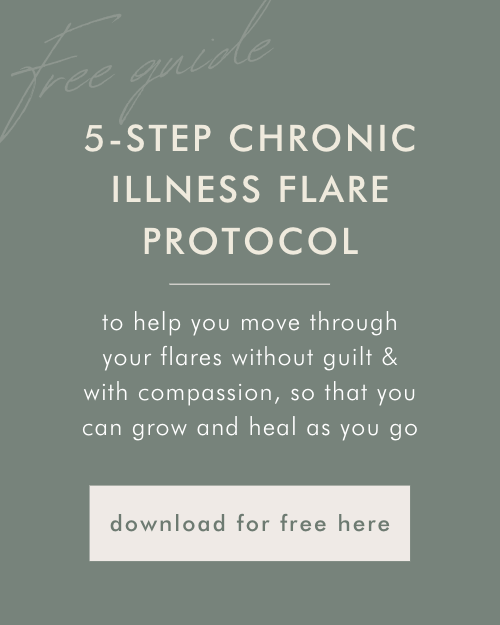8 ways coaching and therapy will help you find peace with chronic illness
Living with chronic illness can be a very private, very isolating and lonely thing (though it doesn’t have to be).
Reasons for this include, but are not limited to:
Shame around how your chronic illness shows up in your life.
Embarrassment (see above).
Trying to put on a brave face to ‘prove’ you’re coping.
Not feeling like anyone understands you or your chronic illness.
Wanting to maintain your independence.
Not knowing there’s help or support linked to chronic illness out there.
Not knowing what questions to ask your coach or therapist.
Trying to keep it ‘all together’ for fear you might break and your chronic illness will consume you.
A rebuttal against the idea that you might become ‘dependant’… I can do this by myself, I don’t need anyone’s help!
After 10 years of white-knuckling it through my chronic illness/healing journey I decided to bring in support (therapy). Incidentally, I also started working with a business coach at a similar time.
Both were decisions I didn’t make lightly, but it came to a point where I just needed that support.
I was exhausted, but also on the brink of big change, and honestly, I both wanted and needed my hand held as I embarked on the next phase of those journeys.
I set the intention when I started working with my business coach that I wanted support to be an integral and fundamental part of my business, because of everything it brings me and how much easier it makes this whole self-employed life.
And now, the same goes for my life. Whether it’s a coach or therapist I’m working with, I want that level of support to be a fundamental and integral part of my life.
(That’s not to say I don’t sometimes take breaks.)
Here are the reasons it’s non-negotiable for me… and why therapy/coaching might be help you, too.
1) My life gets to be about other things.
When I started these relationships, I got to stop talking about this stuff in the rest of my life, which is something I wanted. I love the ‘healing world’ and I love my business, but I honestly got sick of my health being the main topic of conversation (on my part) in my relationship, friendships and within my family. I wanted my life to be about other things. I wanted to talk about other things. I wanted my brain to be freed up… which leads me to…
2) I’m able to compartmentalise more effectively.
I don’t know about you, but my health and chronic illness occupied 99% of my headspace 99% of the time. I was always thinking about what I could do next to ‘fix’ myself, I was always judging what I was doing and how it would effect my skin on a ‘good’ or ‘bad’ scale.
It’s not only the kind of work I get to do with my coach and therapist that I find so supportive and aligned, it’s the fact that I get to dedicate the time I spend with them to it, and walk away from it for the rest of the time (save any planned ‘activities’).
I get to be an ‘athlete’ - check reason 8 for what I mean!
3) It’s more motivating.
The all round energy required to do this work can be big. Having a coach/mentor (and sometimes therapist) keeps you motivated and accountable, when it all feels like a bit of an uphill struggle.
They not only help you stay the course but are there to figure out why it feels so hard, so that you both can understand if there’s something to be done to make it feel more doable.
When you’re going it alone, it's more likely you’ll give up, that it’ll all get on top of you, or you'll hop straight to the next ‘promised healing thing’ with the hope that it’ll work.
4) I get to share the dark sh*t!
The stuff that I don’t want to bring into my ‘real life’, that I don’t want to infiltrate everything else. We all, at times, have low moments. We all think dark thoughts. Not only is the ‘burden’ lightened when you share, it’s also the job of your therapist/coach (arguably not all coaches) to help you process and work through these thoughts and feelings.
5) You get to heal with intention.
Granted, there will always be a level of experimentation in any journey, and that’s something to be celebrated . But there’s a difference between strategic experimentation and experimentation that’s equal to throwing spaghetti at a wall and seeing what sticks.
You get to collaborate and ‘strategise' with an expert in the field, with someone who has your best interests at the core of your relationship with them. You get to bring your expertise on you to that relationships and they’re there to help you connect with those expertise.
There’s always a ‘why’ being answered behind the your experiments and the journey you embark upon, that’s (hopefully) unique to your needs and wants. Quite a contrast to all the things that simply ‘promise healing’ (without context, what does that even mean?)
6) You get to be vulnerable in a safe space.
It’s taxing putting on a brave face all the time, it’s exhausting trying to ‘hold it all together’. Of course vulnerability happens in real life in your real relationships, too. But there’s something different about being able to let it all go, and be held whilst you do.
7) You take the time to work out your ‘why’.
Duh?! But have you ever got into what the why is, behind all the ‘healing’ things you’ve done over the years?
Mine always used to be ‘to get rid of my chronic illness so I can get on with living my life’, or ‘I just want to feel better’ without knowing what that actually looked like aside from the absence of my chronic illness. But what does ‘better’ actually look like? What outcome are you expecting from this work? How will that manifest in your day to day life
8) This level of support brings out the very best in you.
I am a BIG advocate for self-responsibility. But that doesn’t mean having to do it all alone. There’s something that happens when you form a relationship with a therapist or coach that takes so much of that onus off of your shoulders. Of course, you remain the owner of that responsibility, but they hold the weight of it.
I actually used to feel the same thing when I rowed; between my coach and I, I was allowed to focus on being an ‘athlete’ (I’ll use that term semi-lightly 😂) whilst they handled all the strategy, planning, and all the other things that went on behind the scenes that I still have no clue about!
It’s the support that’s needed to allow the full spectrum of who you are to shine.
If you already work with a therapist or coach (in any capacity), what are your reasons?
If you don’t, what’s stopping you?
P.S. I get that coaching or therapy isn’t accessible to everyone, but there are plenty of free or low-investment options out there. Keep an eye on the therapists/coaches you align with, as they may run offers and free experiences from time to time.




